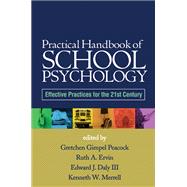
Note: Supplemental materials are not guaranteed with Rental or Used book purchases.
Purchase Benefits
What is included with this book?
Gretchen Gimpel Peacock, PhD, is Professor of Psychology at Utah State University, where she has coordinated the specialist-level program in school psychology and is on the program faculty of the Combined Psychology (School/Clinical/Counseling) PhD program. Dr. Gimpel Peacock’s publications and professional presentations focus on child behavior problems and family issues as related to child behaviors, as well as professional issues in school psychology.
Ruth A. Ervin, PhD, is Associate Professor at the University of British Columbia. Dr. Ervin's research addresses the research-to-practice needs of local school districts and promotes a preventative and problem-solving approach to addressing the academic and emotional-behavioral needs of children and adolescents.
Edward J. Daly III, PhD, is Professor of Educational (School) Psychology at the University of Nebraska-Lincoln. Dr. Daly’s research and publications are in the areas of developing functional assessment methods for reading problems and the measurement and evaluation of academic and behavioral interventions.
Kenneth W. Merrell, PhD, is Professor of School Psychology at the University of Oregon, where he has served as head of the Department of Special Education and Clinical Sciences and as director and codirector of the School Psychology Program. Dr. Merrell’s research and publications focus on social-emotional assessment and intervention in schools.
The New copy of this book will include any supplemental materials advertised. Please check the title of the book to determine if it should include any access cards, study guides, lab manuals, CDs, etc.
The Used, Rental and eBook copies of this book are not guaranteed to include any supplemental materials. Typically, only the book itself is included. This is true even if the title states it includes any access cards, study guides, lab manuals, CDs, etc.